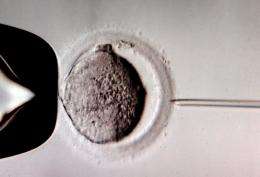IVF babies at greater risk of heart problems in later life

Babies born through IVF procedures are at greater risk of developing heart problems, according to research that suggests “manipulating nature in this way may have some adverse results”, an Australian IVF expert says.
Swiss scientists who compared 64 children born using IVF techniques and 57 children conceived naturally found that among the former group, 30% of the participants showed high pulmonary arterial pressure and greater blood vessel rigidity at high altitude.
The findings are published this week in the journal Circulation. David Celermajer, the Scandrett professor of cardiology at the University of Sydney Medical School, wrote an accompanying editorial in the same journal.
“When all things are considered, IVF parents shouldn’t be concerned,” Professor Celemajer said. “I think that to put it in perspective, IVF has given them by and large very healthy children, and if this is going to signal a problem, it’s going to signal that those children are going to perhaps have premature heart disease maybe in their 50s or 60s rather than in their 70s or 80s.
“So if you stack that up against the gift of life in the first place, I don’t think that parents should be overly concerned at the moment.”
The Swiss research team, led by scientists at Bern University Hospital, believe the increased risk of heart problems in later life is a consequence of chemical processes while the embryo is still in the Petri dish. Chemicals in the cultures are thought to influence the expression of some genes.
But members of the team pointed out that many non-IVF people bear the same genetic markers.
“We cannot yet be conclusive with a study of 65 IVF children,” one of the researchers, Marc Germond, said.
During IVF, doctors take an egg from the ovaries and then co-incubate the egg with sperm in the test tube. Alternatively, they may inject a sperm directly into the egg to assist with fertilisation. The embryo that this process creates is grown in a culture for a few days and then implanted in the mother’s womb.
Professor Celermajer said that this phase was “an incredibly critical phase of development – those first 10 days after the egg and sperm meet to form an embryo, so much happens to determine normal health that even the subtle changes in the physical and chemical environment can cause very important very important developmental changes in the baby at the end of gestation.”
There were two possible causes for the cellular stress that embryos might experience, he said. One was the physical stress of being picked up, injected or manipulated, and the other was chemical stress related to chemicals in the environment of the test tube or changes in the oxygen level. “Sometimes cells in an environment where it’s ever so slightly more acidic, for example, might experience oxidative stress. In lay terms, this affects energy use by the cells and growth and development in an adverse way.”
But the study was “relatively small”, he said, and did not conclusively demonstrate that people born through IVF would suffer more heart attacks or strokes. “It’s just pointed to an area for potential concern rather than immediate concern.”
“It does indicate that you’re more likely to have high blood pressure, probably more likely to have diabetes and probably more likely in middle age to have a heart attack or stroke, and so the sensible precaution would be to take every healthy measure that’s open to you in regards to diet, exercise and regular check-ups with your GP.”
Also of concern, he said was the possibility that stress experienced by stem cells in the embryo might affect not only blood vessels but other organs as well. “So it is a bit of a clarion call to look at the kidney, liver, brain, lungs and other organs which could also be affected.”
Professor Celemajer described IVF as “a miracle” and stressed that the benefits outweighed the potential risks, but added that the growing body of research provided a “somewhat disturbing signal that manipulating nature in this way may have some adverse results.”
The Conversation
















